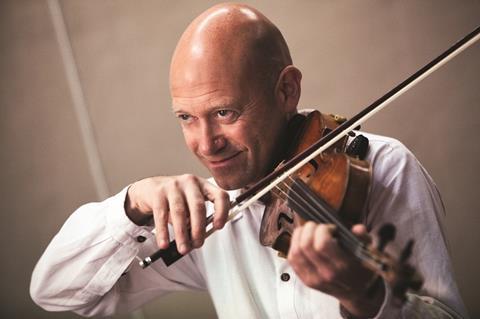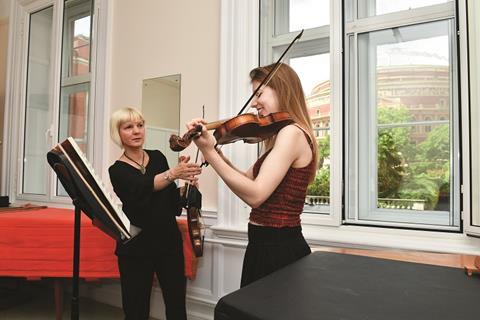Mark Messenger, head of strings at the Royal College of Music, reveals what conservatoire audition panels are looking for

1. Concentrate on Sound
How many hours do we spend in physical endeavour, sometimes with little or no reference to the sound that is coming out of the instrument? When I am auditioning, the aspect I search for before all else is the most fundamental and important component of being a musician: a concept of sound. Does the player understand that music is all about sound, and that manipulation of sound is everything? Sound is the only currency we have and without this we are nothing.
2. Practise performing
Don’t forget that an essential part of your preparation should be dry runs or concert performances of your chosen repertoire. We learn as much through the first performance of a work as in the preceding practice. The more you perform the works, the more comfortable and authoritative you can be at the audition and the less you will think about the mechanics of playing.
3. Look at the broader aspects of your repertoire
If you are playing a concerto, make sure you know the orchestral score intimately, or the piano part for a duo sonata. If you are presenting Bach, be aware of the harmonic structure and be prepared to talk about style. Knowledge of this sort will enhance your playing anyway, but uncovering a lack of awareness at interview is embarrassing for all concerned.
4. Choose the right repertoire for you
Be aware that time is limited in the audition. You may well be stopped a few minutes into your performance of each piece, and therefore repertoire that takes time to get going is not ideal. Personally, I like listening to Bach at audition, but it can be a risky choice if the panel has particular views about how Bach should be played. Think carefully about what you start with; the first impression is extremely important, and if you can begin with something that gives you confidence from the very first note the rest of the audition will go much better.
However, the most crucial advice I can give in terms of repertoire is to play to your strengths. Some years ago, a very promising violinist presented the last movement of the Brahms Violin Concerto at audition. Unfortunately, their main weakness was maintaining intonation and a good tone in double-stop passages; almost any other choice of repertoire would have better served the candidate.

5. Dress sensibly
This hot topic always divides opinion. My view is that I am listening to the playing and the music; it’s not a fashion shoot. A well-dressed player of limited talent will not get far, and a genius can get away with wearing whatever they want. However, most players do not fall into these extremes, so dress in a way that matches who you are and what you hope to become. If I have an important concert, the ritual of dressing carefully for the event always helps my state of mind. However, sometimes what might seem like a lack of care in others can be misconstrued. The panel member who abhors candidates wearing trainers at an audition might not appreciate that those particular trainers may have been purchased (at great cost) for the occasion.
6. Take care over tuning your instrument
A quick check-tune is better than playing on an out-of-tune instrument and might also help you get a sense of the acoustic. But try to avoid potentially annoying tuning mannerisms (for instance, repeatedly turning the pegs so rapidly that you have no real chance to hear whether the instrument is in tune or not), or ending up with your instrument out of tune even after trying to tune it before you play.
7. Take advantage of silence
Music comes from silence and ends in silence. The silence before you play is like the blank canvas on which the painter makes the first stroke of the brush. If you use this moment well, you demand that your audience listen to you. If you waste it, then it will be much harder to convince them thereafter.
8. Don’t waste your warm-up time
As was once said to me: ‘Practising on the day of a concert is like a dying man going for a run,’ so do not unpick passages in your pieces. If you have a chance to rehearse with the pianist and you are, hypothetically, playing Mozart and Martinů, don’t spend 90 per cent of your rehearsal time on Mozart; the pianist will have played this many times before and you may need more time together to create a convincing performance of the Martinů
9. Be ready for anything
Accept that, as with the best concert performances, anything can happen. The danger with an audition is that we try to control too much what might and could happen musically, forgetting that when we perform, it is our creativity that is our strongest asset. I can and do forgive most things when I listen; what is unforgivable is when a performance is boring.
10. Finally
The audition is a two-way street. You may be auditioning to enter one of the great conservatoires of the world, but this must also be an institution in which you will feel able to work, play, grow and be respected. If, after all your months and years of preparation, you feel you are not the most important person in the room for the duration of the audition, you probably should consider whether that is the institution at which you wish to study.
Messenger photo: Kirill Bashkirov. MacDonald/Martin photo: Chris Christodoulou
This is an extract of a longer article in The Strad’s September 2018 issue. To read in full, download the magazine now on desktop computer or via the The Strad App, or buy the print edition




































